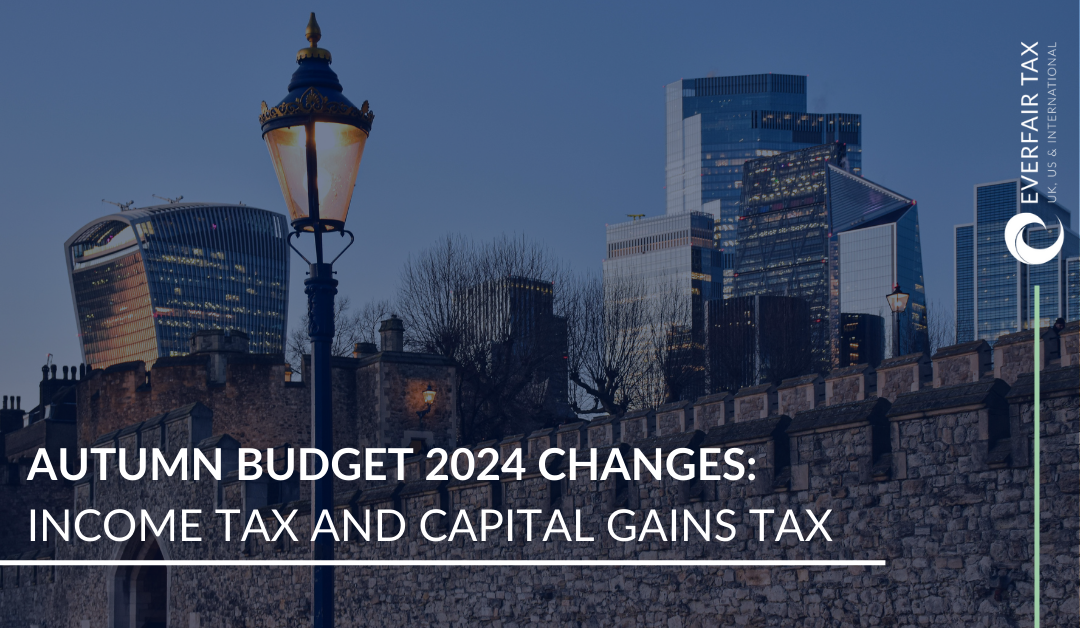Capital Gains Tax (CGT) is something that most people experience having to pay at various points in their lives. It is a tax that has changed significantly over the years and can arise in unexpected situations.
As a result of the many changes, understanding the reliefs which might be available to reduce the amount due has become more complex. In this page we try and set out the key things that people should know in order to identify when CGT may be due and what steps if any can be taken to reduce a liability when it arises.
Contents
UK
Gifts and Sales and Undervalue
Share Pooling & Cryptocurrency
Selling an Interest in a Business
Non-Resident Capital Gains Tax
When You Need to do 30 Day Reporting
USA
US Aspects of Capital Gains Tax
Foreign Trusts & Capital Gains Tax
Additional Capital Gains Tax Resources
What is Capital Gains Tax?
Capital Gains Tax (CGT) is the tax levied on profit when an asset is sold.
For example, if you bought something for £250,000 and you then sold it for £500,000 then CGT would be due on the £250,000 profit.
However, no CGT is due if the gains (profits) are under the annual exemption which is as follows:
2022/23: £12,300 per person or a maximum of £6,150 for trusts
2023/24: £6,000 (£3,000 for trusts)
2024/25: £3,000 (£1,500 for trusts).
Losses
It is possible to reduce the CGT due by deducting capital losses.
What does this mean?
If you sold or disposed of two assets, where one made a loss and the other made a gain, you could offset the loss against the gain. Then, you only pay CGT on the difference.
There are some criteria however, that need to be followed:
- Losses in one tax year, should be offset against gains in the same tax year
- Unused losses can be carried forward to subsequent tax year capital gains
- Losses from the current tax year must be offset against gains before any unused losses can be brought forward from previous years
- Capital losses can only be carried forward, not back, except in the case of death of the individual
- Any losses must be claimed within four years of the end of the tax year
To fully utilise the capital loss system, it could be worth considering selling assets across multiple tax years, so as not to waste the annual exemption.
Gifts and Sales and Undervalue
Even if you gift an asset, this is still classified as ‘disposal’ for CGT purposes. It could be eligible for tax if the value of the asset at the time of ‘disposal’, is higher than when it was purchased. Even if no money has exchanged hands.
Undervalue is the difference between the market value of an asset, and the amount it has been sold for.
There are certain reliefs and exemptions which could be applied to a gift which include:
- Annual exemption – which for 2022/23 is £12,300 for individuals and a maximum of £6,150 for trusts, reducing to £6,000 for 2023/24 (£3,000 for trusts) and £3,000 for 2024/25 (£1,500 for trusts)
- Business Asset Disposal Relief (Entrepreneurs’ Relief) applies if the assets are trading assets, and tax could be due at 10% if all the relevant criteria are met
- Rollover Relief (for transfers at an undervalue only) is when the asset is a trading asset and any monies received have been reinvested back into the business
- Gift Relief allows the valuation to be delayed, until the donee has been able to sell or dispose of the asset
- Holdover Relief is when the gift is subject to Inheritance Tax and is often part of a trust fund
- Spouse Exemption is when the asset has been gifted to a spouse or civil partner
- Private Residence Relief (PRR) could be applied if the gift is your current residence. This could be partial or total relief.
Share Pooling & Cryptocurrency
Share pooling refers to the cost of acquiring shares in the same class in the same company for the purpose of calculating the gain on disposal.
It is worth noting that HMRC does not consider cryptocurrency to be money and Capital Gains Tax applies to crypto assets and cryptocurrency using the share pooling rules.
Any profits on crypto assets or traditional shares will be either taxed as Income Tax or as Capital Gains Tax, depending on whether you are trading or investing.
If your profit is considered as capital then:
- There could be tax relief on the cost of buying and selling the asset
- You can offset any CGT exemptions if unused
Selling an Interest in a Businesses
Business Asset Disposal Relief (BADR) reduces the amount of CGT to 10% on assets where the gains push you into a higher tax bracket. It is only available to individuals and trustees.
BADR can apply to the sale of sole trader business, partnership interests, shares in your trading company, joint venture interests and certain business assets or shares in trust.
There is a lifetime allowance for BADR which sits at £1 million from March 2020.
There are varying allowances based on earlier years, and the CGT owed relates to the rate at that time. Anything over this £1 million lifetime allowance, is taxed at the full rate.
EIS, SEIS and Holdover Relief
Enterprise Investment Scheme (EIS) is Income and Capital Gains Tax relief for investors in smaller investment companies. There is no minimum amount of investment required, with a maximum of £1 million.
- There’s no CGT on EIS shares which are disposed of after the minimum holding period
- CGT can be deferred, if the gains are invested in EIS shares
The Seed Enterprise Investment Scheme (SEIS) allows investors to be CGT exempt if they reinvest their gains in a SEIS. The SEIS companies have to be recently founded organisations with fewer than 25 employees and gross assets of no more than £200,000.
- The investor can be a director of the company
- The investment stake is below 30%
Another relief that can be used is Holdover Relief, which is a deferral of CGT.
When assets are distributed from a trust, Holdover Relief may be able to be claimed to defer gains so that no CGT is payable when the beneficiaries sell them some years later if within their own CGT annual exemption.
If there are numerous beneficiaries and the distribution and subsequent disposals are spread over a number of years then the CGT can also be deferred over the same number of years.
However, if Holdover Relief is applied and then the recipient becomes a non-resident then they may be liable for the held-over gain on becoming non-resident. It follows that Holdover Relief is also not applicable if the recipient of a gift is a non-UK resident.
Holdover Relief is not automatic, and a claim needs to be submitted.
Residential Property
As a general rule, if you sell your home you are not liable for Capital Gains Tax on the profit made from the sale.
However, if it is a second home or a property bought for investment you could be liable for CGT.
Additionally, you may be eligible for CGT for part of a gain if the property:
- Has in excess of 5000 square meters of land
- Has been sub-let
- Has a permanent business element to it (not a spare room as an office but something more permanently business focused)
Private Residence Relief (PRR)
Private Residence Relief (PRR) is automatically applied when you sell a property.
Full PRR relief is likely to be given if ownership is covered by a combination of:
- Occupation as a main residence
- The final nine months owning the property
However, if the property is a second home or you bought it as an investment you could still be eligible for CGT.
If your second home had at one point been your main residence you may be eligible for relief, but this could affect the tax relief on your current main residence.
Full PRR relief is likely to be given for:
- The final nine months owning the property
- The years lived in the home as a residence
Therefore, to calculate the PRR allowed, you work out the:
Amount of time you lived in the property (+ nine months) divided by the length of time you owned the property x 100
For example:
You lived there for 1 year (+nine months) 21 months divided owning the property for three years (36 months) x 100 = 58%
100% – 58%= 42%
Therefore, you would be liable for CGT on 42% of the profit made on the property sale.
No relief is given where a property is bought with a view to selling at a profit even if it is a main residence.
Non-Resident Capital Gains Tax
Non-Resident Capital Gains Tax (NRCGT) is a tax applicable to any non-UK residents who sell or dispose of UK land or property. There are two types of disposals:
- Direct disposals where an individual sells UK land
- Indirect disposals where an individual sells shares in a company with UK land. This is where the taxpayer has a 25% investment in a company which derives 75% of its market value from UK land or property
The calculations to work out how much CGT is owed is the same as for a UK resident.
However, if the property or land was purchased prior to 6 April 2019 it depends on the status of the land upon purchase as to the amount due.
60 Day CGT Reporting for UK Property
From 27 October 2021, UK residents are required to report and pay CGT on any gains from the sale of a UK residential property to HMRC within 60 days of the completion of the sale. CGT is not generally payable on your own home (subject to some conditions) so will not usually need to be reported within 60 days.
Non-residents are required to report and pay CGT on disposals of all UK property, not just residential property, within 60 days.
Failure to report and pay any CGT within 60 days will end up in HMRC issuing fines.
CGT on residential property is higher than other assets with basic rate taxpayers paying 18% and higher rate and additional rate taxpayers paying 28% although there is the annual exemption.
Divorce and Capital Gains Tax
From April 2020 there have been changes to the CGT in regard to divorced couples. Under the new rules the spouse moving out of the home will only have nine months to sell their half of the assets before they will be eligible for CGT.
After this time, they will be liable to any CGT at a rate of 18% (basic rate taxpayer) or 28% (higher rate taxpayer).
The only exemption to this nine-month final period exemption is for those with disabilities, or if the spouse has moved into a care home. Then the final period exemption is extended to 36 months.
Trusts and Capital Gains Tax
Capital Gains Tax is also due on any profit or gain from an asset which has increased in value while held in trust. CGT on assets held in trusts is paid either by the:
- Trustees
- The settlor who is transferring the asset (but only for certain non-UK trusts)
There are two main types of trust; settlor interested and non-settlor interested. The settlor interested trust is one where the person setting the trust up will benefit from it.
Trustees pay CGT if the gain is higher than the trust annual exemption noted above though the individual annual exemption can apply if the beneficiary is classed as vulnerable. The higher amount can also apply if there are multiple beneficiaries and only one is classed as vulnerable.
There are also various tax reliefs which can be applied to Capital Gains in trusts which include:
- Private Residential Relief (PRR) – No CGT is payable if the trustee sells a property that is part of the trust and is the main residence of someone eligible under the trust’s guidelines. Unlike relief for individuals, relief for trusts must be claimed.
- Business Asset Disposal Relief (BADR) – There is relief from CGT if assets used within a beneficiary’s business are sold. There is also relief if shares are sold where the beneficiary has a minimum of 5% and voting rights.
- Hold-Over Relief – There is no CGT when the trustees distribute assets from the trust to the beneficiary. It is only payable if those assets are sold or disposed of.
US Aspects of Capital Gains Tax
The US tax on capital gains depends on whether the gain is considered to be long-term or short-term.
- A short-term gain is one that derives from the sale of assets held for less than one year. The tax rate applied is the ordinary income tax rate.
- Long-term capital gains arise on the sale of assets held for one year or more. The tax rate on long term capital gains is capped at 20%.
There is also a higher rate of 28%, which is applied to specific assets such as antiquities, fine art and coins.
Special rules can apply where gains or losses are made in respect of the sale of assets used in a trade or business.
Capital Gains Tax Losses in the US
Generally, capital losses can only be offset against capital gains. However, if capital losses for the year exceed capital gains, up to $3,000 ($1,500 if married filing separately) can be set against other income, with the remainder carrying forward to the following year.
Home Sale Exclusion
If you have made capital gains through selling your main home there could be an allowance of $250,000 of gain, or $500,000 if filing a joint return with a spouse.
To be eligible you have to have owned and lived in the property for a period or periods totalling at least two years out of the five year immediately preceding the sale. You can only use the Home Sale Exclusion once in any two-year period.
Share Matching Rules
Where the UK operates a pooling approach to match shares sold with shares purchased, US tax rules typically dictate that a First-In-First-Out approach is taken.
Meaning, that the tranches of shares acquired first are those deemed to have been sold first.
However, the IRS will accept a pooling methodology in cases. In particular, where the assets disposed of are mutual funds, where dividends and distributions are reinvested.
Gifts and Gifting
In contrast to the UK treatment of gifts, the US Tax Code does not typically treat a gift as if it were a disposal of an asset. Therefore, in most cases, gifts of appreciated assets can be made without any risk of an income tax charge.
Divorce & Capital Gains Tax in the US
In many cases, assets transferred in the process of a divorce will not be considered a disposal for US tax purposes, providing that certain conditions are met.
Foreign Trusts & Capital Gains Tax in the US
If a foreign trust makes a distribution to a US citizen, the distribution would be liable for both Income and Capital Gains Tax in the hands of the beneficiary to the extent of Distributable Net Income (DNI).
The income proportion of the DNI will be taxed at the standard income tax rates but the long-term capital gains income will be taxed at the long-term capital gains rates (see above).
However, where the distributions are sufficient to exhaust DNI for the year, complex rules known as the “throwback tax” rules can apply.
The throwback tax rule however acts as if the beneficiary of a trust income received the income in the same tax year as the trust earned it, even if the distribution occurred in a subsequent tax year.
Tax is charged at the beneficiary’s average income tax rate over a three year period (regardless of its original nature as income or capital gain), and interest is charged in order to eliminate any benefit from the deferral of tax.
Capital Gains Tax News, Blogs & Resources
-
2024 Autumn Budget – Income Tax and Capital Gains Tax

Reading Time: 3 minutesSummary of Changes for Income Tax and Capital Gains Tax Affecting Individuals The current non-domicile tax regime, including the remittance basis of taxation, will be abolished from 6 April 2025. It will be replaced by a new “residence based” approach. This note focuses on how the changes affect income tax and capital…
-
Autumn Statement 2022

Reading Time: 2 minutesWith 2022 seeing record high inflation and the UK heading into recession, today’s Autumn Statement was always going to be a very tricky balancing act for our new PM Rishi Sunak and his Chancellor Jeremy Hunt. With the previous mini budget resulting in market turmoil, followed by the subsequent reversal of most…
-
Taxation of Cryptocurrency

Reading Time: 3 minutesWhat is cryptocurrency? Cryptocurrency is a form of digital currency, which can be purchased in a variety of means; from exchange platforms such as Coinbase and Kraken, to some online banking platforms. With the ever-growing nature of cryptocurrencies there will always be a new form or version of digital currency, such as…
-
UK Spring Budget 2022

Reading Time: 2 minutesThe Chancellor Rishi Sunak delivered todays Spring budget under the backdrop of inflation being revealed to have risen to 6.2%. The highest rate of inflation for 30 years. This had been made worse by rising fuel prices and will result in significant increases to the cost of living. There is also recognition…
-
How do double taxation agreements work?

Reading Time: 2 minutesA double taxation agreement is designed to do exactly what it says – prevent double taxation. It is a treaty between two countries which…
-
Inheritance Tax Rate and Capital Gains Tax UK Rate 2021 | Actions you can take:

Reading Time: 3 minutesFollowing on from our recent blog, as promised, we’re sharing some actionable next steps for you regarding the potential changes to the…
-
Changes to Capital Gains Tax UK 2021 – how they’ll affect you:

Reading Time: 4 minutesCapital Gains Tax UK & Inheritance Tax threshold UK in 2021 – what’s ahead? We’ll share our professional recommendations with you now….
